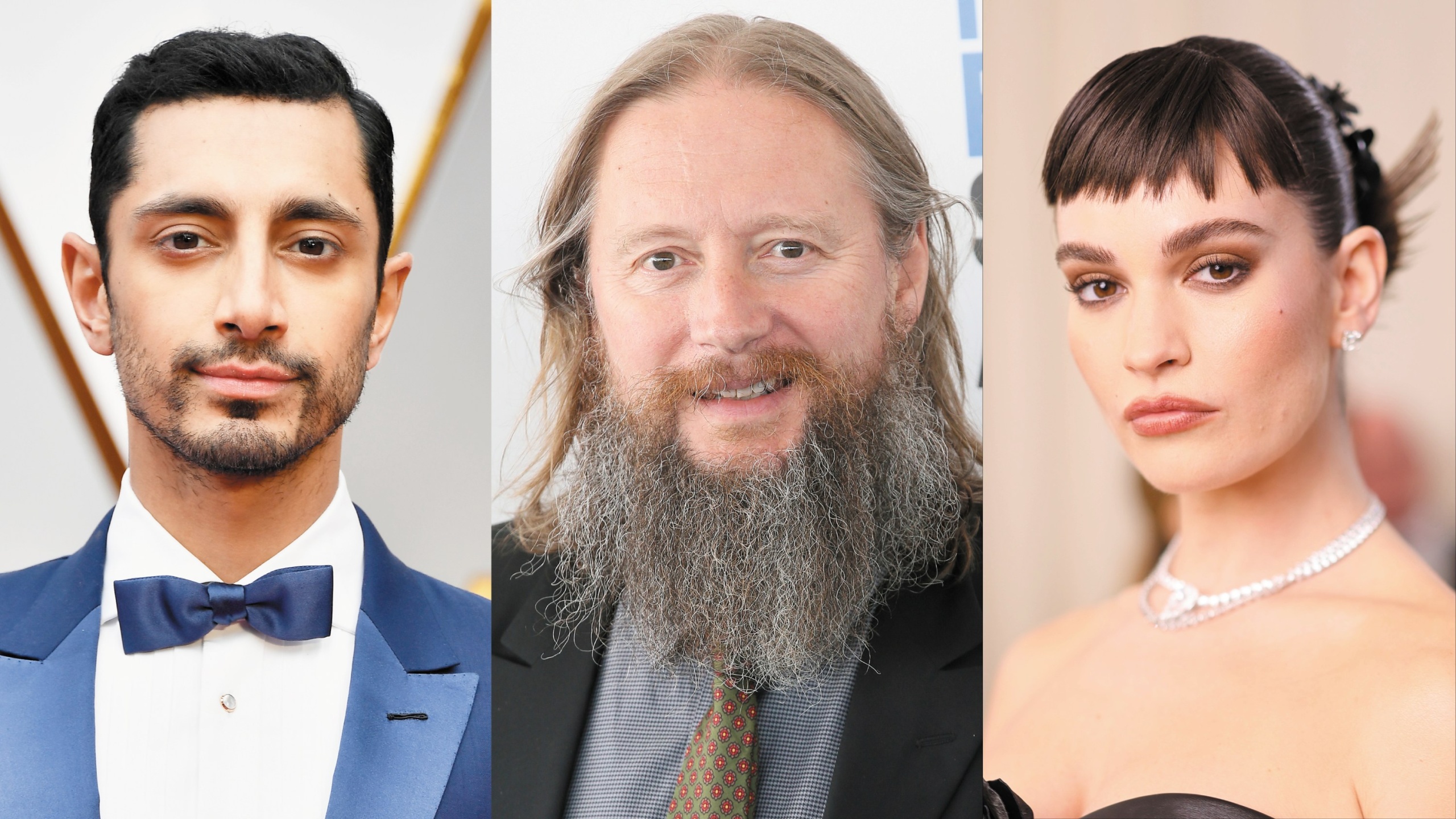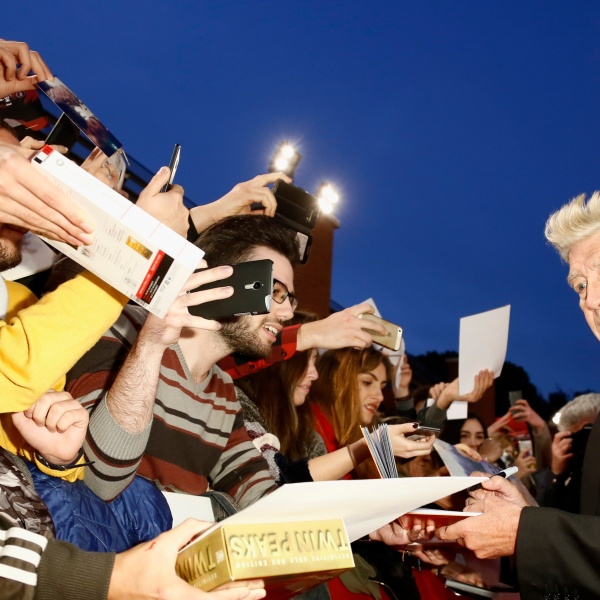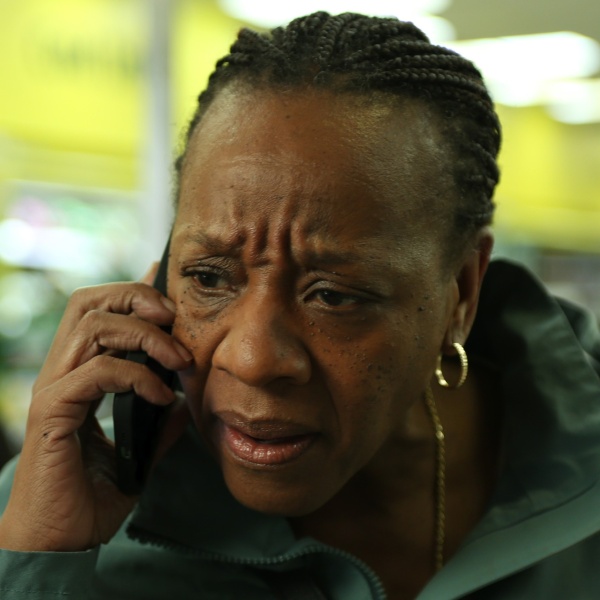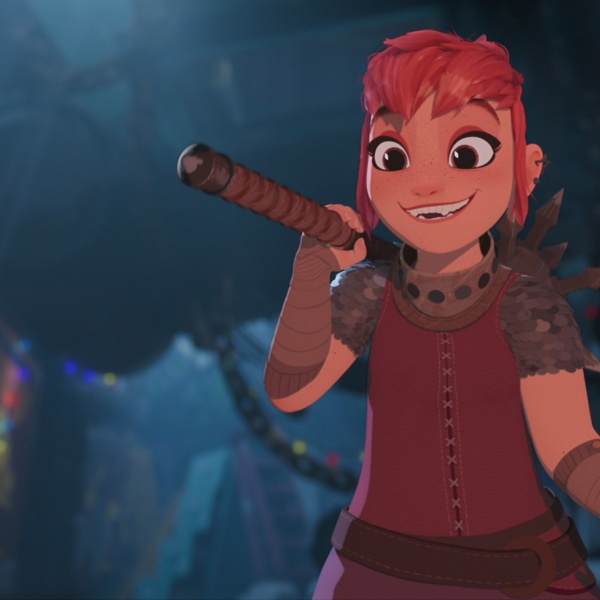About thirty minutes into David Mackenzie’s latest, the clever throwback thriller “Relay,” something funny happens. Or doesn’t happen, really, as that’s about the moment when keen audiences will notice that our protagonist, played by Riz Ahmed, hasn’t yet said a word to another person.
Named for the message relay services that help people with a hearing or speech disability to make and receive telephone calls via text (and a human relay operator as ironclad intermediary), “Relay” is the latest film in Mackenzie’s ever-shifting filmography, this one a modern spin on the kind of paranoid thrillers that were so common during the ‘70s.
“I can’t remember whether it was in the early drafts, but it’s been like that for quite a while in ours,” Mackenzie said during a recent interview with IndieWire. “It was just the idea that this person is doing everything without any direct communication with other human beings, which sort of adds to the aloneness of it and the sort of weird sort of tension and paranoia.”
It’s a bold and smart choice in a film rife with them. “Relay” follows Ahmed’s character, a self-employed fixer type whose bread and butter is assisting would-be whistleblowers with a) returning their damaging documents to the very baddies they first stole them from and b) ensuring their lives can go back to a semblance of normal after the deal is done. Not only do we not hear the guy speak for a full act of the film, we don’t even learn his real name until the feature is nearly over (he alternately goes by John, James, and Ash throughout). And his motivations? Those take awhile to unspool too, as does the full predicament facing his latest client, Sarah Grant (Lily James).
“This isn’t a high-concept AI, internet kind of movie, definitely one of the most distinctive aspects about it is how the main characters communicate or don’t communicate,” Ahmed told IndieWire. “From an acting point of view, that was really exciting to me, that you’ve got a director like David who can just bring characters to life with so little and bring out these complex relationships. It felt like a lot of fun.”
For Mackenzie, who has done everything from the period war picture “The Outlaw King” and lauded crime thriller “Hell or High Water” to the zippy concert-set romance “You Instead” and the kooky Jamie Bell character study “Hallam Foe,” there is connective tissue here.
“I always like a third act that doesn’t feel like it’s being prescribed by the first act,” the filmmaker said. “So, you’re not tying up a loose end directly, although obviously you are, but you’re taken to a different place. I’m always interested in outsider characters, and Riz’s character is a pretty extreme outsider character. And, not always, but I like swimming in the dramatic version of political waters. Not trying to hammer home a political point, like in film ‘Hell or High Water,’ you’re saying something, but you’re looking for a dramatic truth as opposed to a kind of factual truth.”
As that applies to “Relay,” which is debuting at this year’s Toronto International Film Festival this week, Mackenzie added, “I hope it’s a thriller. I hope it’s exciting. I hope there’s a human connective element to it and all those things, but also it’s sort of in the background saying something.”
While Ahmed’s character has built his life around processes and structures meant to keep him safe and anonymous — his communications with his clients consist of the use of the relay system, plus old-school trappings like message services and the postal service’s mail forwarding — the jittery Sarah tears down his defenses early. A former researcher for a major food conglomerate, when we meet Sarah, she’s begging an attorney to help her out of a jam: she’s got documents that prove her now-former employer is about to roll out a new wheat strain rife with the potential to harm many consumers. She doesn’t want to blast them to the world, she just wants to give them back so everyone (like Sam Worthington and his very shady surveillance team) can leave her alone.
That’s about as much is fair to share before audiences see the film, which is packed with twists and turns that are genuinely exciting and well-earned.

“You don’t want to give things away with thrillers. It’s the suspense and the kind of having the rug pulled from under your feet, what you think is happening isn’t happening, it’s pivotal to make for the success of these kinds of stories,” James told IndieWire. “I was genuinely surprised by how things unfolded, by the different characters and the secrets they have, with the characters’ motivation for why they’re doing what they’re doing it, who’s the villain, who’s the good guy, who’s protecting, who’s in it for money, who’s in it for morality or whatever it is, it keeps shifting and turning. I felt like the script was really effective at keeping the reader unsure of what would happen on the next page.”
Mackenzie said he was attracted to the film because of the way it echoed the paranoid thrillers of the ‘60s and ‘70s he loved — stuff like “Three Days of the Condor” and “Parallax View” and “Point Blank” and even something more recent like “Michael Clayton” — the kind of films where, as he said, “You’re sort of feeling like the strange corporate forces are all around you and are kind of at work against you.” Well, they are.
“I don’t tend to look at any [other] films when I’m making a film, I tend to try and keep my experience of making the film as close to the scenes themselves and the relationship with the actors themselves,” Mackenzie said. “Although I’m very happy to be swimming in that territory, because I love those films. It’s much better to find your own way through the territory rather than sort of pay homage.” (When we spoke, Mackenzie had one day left of shooting on his latest, the heist film “Fuze,” and he admitted he briefly considered watching some heist films beforehand, before remembering what has worked for him in the past.)
“David gave me a ton of those classic thrillers watch to get into the right vibe and tone, and it felt really authentic,” James said. “Just by the nature of the way that they need to communicate, being this old relay system and using the post office, it was such a brilliant throwback. Once you take away a mobile phone, there’s automatically this greater need for connection and greater kind of drama.”
“It’s sort of that weird way of circumventing surveillance, which I think is just fascinating,” the filmmaker said of the relay system at play in the film. “In the digital world, it’s very, very, very hard to slip under the radar, because you’re very, very trackable in every way, anytime you use credit cards, anytime you use a phone. So just that sort of weird game that Ash and Sarah and his other clients have to play in order to communicate and in order to look after themselves feels kind of thriller-ish in a cool way. The old technology also sort of harks back to those cool ’70s thrillers that kind of feel in the DNA of this project and hopefully echoes in it a little bit.”

Mackenzie was first attached to Justin Piasecki’s Black List script before the pandemic — “it slightly went into the backwater for a little while and then came back again,” he said — and once Mackenzie was back on board, he and Ahmed started working on it together to add in “the elements of the details” that help shade Ahmed’s character. Details about him are meted out slowly and steadily, but that only adds to the sense of discovery prevalent in “Relay.”
“What I think is really interesting is if the specificity of a character is layered within the story without boxing the character in,” Ahmed said. “You spend half an hour of the film not even hearing him speak, you spend the longest time not knowing what his name is, or really knowing anything about him. It still important to us — and I think the audience — that when it finally all comes together, you really understand who he is, what his background is, and how that kind of forms a part of the puzzle.”
As serious as this might all sound, Mackenzie and his cast have plenty of fun with it. Ahmed gets to slip into a series of disguises that further allow his character to go unnoticed — a delivery guy, a cop, a construction worker, and more.
“That’s what we’re looking for: somebody who can be a delivery bike rider and get lost and they’re everywhere in every big city in the world now and particularly in New York, and you wouldn’t know who they were,” the filmmaker said. “They’re kind of almost invisible. We interviewed a lot of former spies and former whistle-blowers, and one of the former spies was really interesting. She said, ‘Never forget the power of underestimation.’ If people underestimate you, if people think lower of you than you actually are, you can slip and move around in certain circles. How you disguise yourself is as much about trying to become irrelevant as anything else.”
While Ahmed’s character is zipping around the city and his office in New Jersey — the film was shot on location last spring — James’ Sarah is rattling around a downtown apartment and trying desperately to ensure Ahmed’s character will really be able to help her. Slowly, the pair start to bond, even as they don’t directly speak.
“I was really frightened to take this movie, because I really wanted to work with David and Riz and I loved the script, but I was like, oh my gosh, all of my dialogue, all my scenes with Riz, pretty much are on the phone,” James said. “Phone acting is the worst. I need to be looking at someone in the eyes. I need to be feeding off what they’re giving me, otherwise I’m in my own head and I’m just thinking about myself and that’s hell on Earth. But I knew that David could pull it off cinematically.”

Eventually, Ahmed’s character pushes Sarah into scarier spaces: like taking a brief trip to Pittsburgh to draw out the surveillance team on her tail. As freaked out as she is, Sarah gamely plays along.
“She can totally carry the weight of the duality of that character,” Mackenzie said of James. “It’s easy to feel that she’s a good guy. I think she’s got a vulnerability. What I was among the things I was most happy with, was the kind of a slightly nerdy sort of jittery, nervous scientist thing that she got into. I found it very believable, but also endearing, and that’s part of what happens in the sort of ongoing connection between her and Riz.”
(While Ahmed and James are very much the stars of the film, Mackenzie’s casting of supporting characters is just as essential, including “Strange Darling” breakout Willa Fitzgerald, who plays a memorable member of the surveillance team. “I’ll tell you what, during the course of filming, I thought, ‘Willa’s a bloody star,’” Mackenzie said. “She was great. I’m sorry that we can’t claim the credit for her becoming a star, but hopefully we’re part of that journey for her.”)
So, how do you build chemistry and drama when the bulk of your film involves your main characters chatting on the phone via another person, or just typing things, or simply leaving each other messages? Old school stuff, of course, like rehearsals.
“We had a lot of rehearsal time and we worked on the script, David, Riz, and I, very collaboratively in a rehearsal process, finding the exact marking through each phone call and seeing the growth of their relationship,” James said. “The distance and space between them added a lot of tension, but you still needed to really feel this relationship blossom and deepen through a phone.”
Added Ahmed, “We were working six, seven days a week just to continue to tweak and nuance the script and the relationship. It’s such a delicate thing to try and navigate, when there isn’t that direct face time between the two characters.”
Both Ahmed and James pointed to a pivotal scene in the film in which Ahmed’s character, increasingly feeling concerned for Sarah, breaks his own code. He calls her directly, even if she still thinks she’s talking to someone through the relay system. She doesn’t know what kind of boundaries are being pushed here, but we do.
“He has a very, very clear system, and that system is designed for success in his job, so he has this system that is meant to work professionally,” Ahmed said. “But also on a personal level, it’s supposed to insulate him from forming relationships that yes, might threaten him physically and threaten his safety, but also you get a sense that he’s someone who is uncomfortable letting people into close emotionally. So he’s taking a professional risk, a personal risk and emotional risk.”
Ahmed laughed. “I’ll just come out and say: that scene was my wife’s [novelist Fatima Farheen Mirza] idea. We had a newborn at that time and I was running off to do all these rehearsals on the weekend, she’d be like, ‘Well, tell me what you’re up to,’ and I was telling her about it, and she was like, ‘You know what you guys should do? Should find a moment where he actually calls her.’ I remember when I told David and he was like, ‘That’s genius.’”

“That was a real kind of key to deepening this bond when they really do meet,” James added. “There’s a strange romance for the audience to see these two characters growing to trust and love one another, there’s a genuine bond that develops. We all live on our phones, and I so relate to those moments where you’re feeling so intimate and close to someone through a phone.”
Rest assured, the pair are not on their phones the entire film, and it all leads up to an action-packed final act — the “different place” Mackenzie so loves — in which both James and Ahmed get to flex some action muscles.
That element was “really scary, but really appealing, and part of the reason I wanted to do it,” James said. “I haven’t often had those roles and that opportunity and it’s something I really want to do more of. It definitely just sort of whetted my appetite, wanting to do a load more.”
Ahmed is also eager to keep pushing further into the actions space. “The more I do it, the more I feel like action is the highest form of acting, because it requires such a precision and such a kind of technical kind of prowess, and within that, to also find the life, the spontaneity, the emotion,” he said. “The more I do it, the more intrigued I am by it and more I have respect for people who are living in that kind of zone every day.”
The film is blast to watch in the theater, and Mackenzie is hoping it lands a distributor hip to that.“ I would love it to [get a theatrical release], because I love the idea of that joint experience of feeling it,” the filmmaker said. “I know that we’re looking for a home for it, and as much as I had a great time with a streamer on my last movie [Netflix’s ‘The Outlaw King’], the lack of theatrical was a shame, particularly because you want to make things for that experience. But I fully accept that there’s multiple ways of watching movies, I’ve watched plenty of them on my computer and all that.”
Added James, “Of course, I want it in the cinema. It’s made to be on a big screen. Watching a movie collectively, especially when it’s a thriller, if you can feel the audience hold their breath, if you can feel the audience like gasp when they’re surprised at certain twists and turns in this story, it just adds the tension and the drama.”
Ahmed is a bit more measured: he just wants people to watch it together, all the better for post-screening discussions about the who and the what and the how of what they just watched. “I would say that I just really want people to enjoy this movie together, and that might mean in a theater, that might mean at home, watching it together,” Ahmed said. “There’s a kind of thrill ride to this, and it has the twists and turns in it, and it has the love story. It’s a date night movie. It’s like a movie where you kick back and really enjoy the ride. It’s a film that’s going to take you on a ride.”
So, where does this fit in the ever-expanding oeuvre of Mackenzie films? Quite well, it seems.
“As I get older, I’m trying to make films that are a little bit more commercial than ‘Hallam Foe,’ for example, just because I’d like a wider audience,” Mackenzie said. “That’s the hope with this one: it’s an engaging, quite paranoid, tense thriller with some human connection in there. I think it’s the right time, right place for something like this. But there’s no formula for it. In fact, there’s anti-formulas for it, which is trying to avoid treading the same material.”
He added with a laugh, “Filmmaking is hard enough without having to feel like you’re going through the same old motions.”
“Relay” will premiere at the 2024 Toronto International Film Festival. It is currently seeking U.S. distribution.




